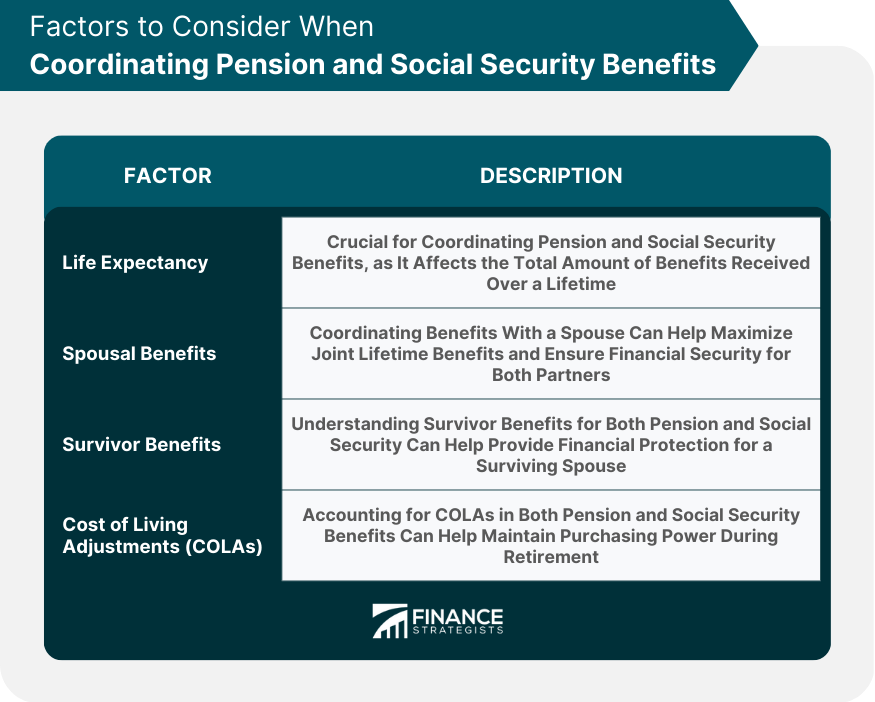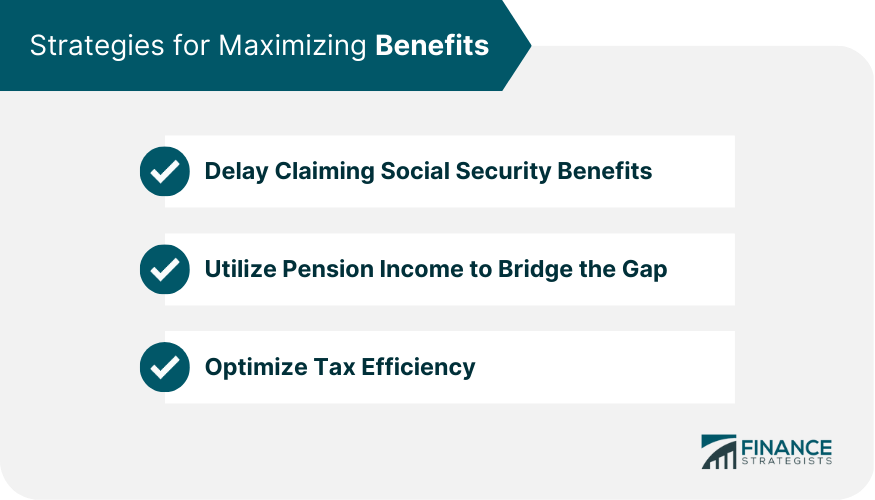Pension and Social Security benefits are two primary sources of retirement income for many individuals. Pension plans are employer-sponsored retirement plans that provide a predetermined monthly benefit or a lump-sum distribution upon retirement. Social Security is a government-sponsored program that offers monthly benefits to eligible retirees based on their earnings history and age at retirement. Coordinating pension and Social Security benefits is crucial for maximizing retirement income and ensuring financial security. Proper coordination can help individuals develop a comprehensive retirement income plan that meets their needs and goals. Defined benefit pension plans guarantee a specific monthly benefit based on factors such as salary, years of service, and age at retirement. Defined contribution plans, such as 401(k)s and 403(b)s, allow employees and employers to contribute to an individual account, with the retirement benefit depending on the account's value at retirement. Individuals become eligible for Social Security benefits after earning a minimum number of credits through work and paying Social Security taxes. The full retirement age for Social Security benefits ranges from 65 to 67, depending on the year of birth. Social Security benefits are calculated based on an individual's highest 35 years of earnings, adjusted for inflation. The benefit amount increases for each year that claiming is delayed, up to age 70. Various claiming strategies, such as early, full, or delayed retirement, can impact the amount of Social Security benefits received over a lifetime. Claiming pension and Social Security benefits early can result in reduced monthly benefits. However, for individuals with pressing financial needs or shorter life expectancies, early retirement may be the best option. Claiming benefits at full retirement age ensures that individuals receive their full pension and Social Security benefits. This strategy can provide a stable retirement income but may not maximize lifetime benefits. Delaying pension and Social Security benefits can result in higher monthly payments, maximizing lifetime benefits for individuals with longer life expectancies. Considering life expectancy is crucial when coordinating pension and Social Security benefits, as it affects the total amount of benefits received over a lifetime. Coordinating benefits with a spouse can help maximize joint lifetime benefits and ensure financial security for both partners. Understanding survivor benefits for both pension and Social Security can help provide financial protection for a surviving spouse. Accounting for COLAs in both pension and Social Security benefits can help maintain purchasing power during retirement. Delaying the claiming of Social Security benefits can result in higher monthly payments due to delayed retirement credits. Delaying Social Security benefits can also maximize spousal and survivor benefits, ensuring financial security for both partners. A lump-sum pension distribution can be used to cover living expenses while delaying Social Security benefits, allowing for higher monthly payments later in retirement. Pension annuity payments can also be used to bridge the gap between early retirement and full retirement age, enabling individuals to delay claiming Social Security benefits and receive higher monthly payments later in retirement. Coordinating pension and Social Security benefits with other income sources can help manage taxable income and reduce tax liability during retirement. Strategically converting traditional retirement accounts to Roth accounts can help minimize taxes on Social Security benefits and pension distributions. Evaluating income needs and goals in retirement is essential for coordinating pension and Social Security benefits effectively. Diversifying income sources by investing in various retirement accounts, such as IRAs and 401(k)s, can provide additional financial security and flexibility. Investment income, such as dividends and capital gains, can supplement pension and Social Security benefits, providing additional financial stability during retirement. Engaging in part-time work during retirement can help supplement pension and Social Security benefits, allowing for greater financial flexibility and the potential to delay claiming benefits. Individual circumstances, such as health status, family situation, and financial goals, should be considered when coordinating pension and Social Security benefits. Working with a financial professional can provide valuable guidance and assistance in coordinating pension and Social Security benefits, as well as developing a comprehensive retirement income plan. Selecting a financial advisor with expertise in retirement planning and knowledge of pension and Social Security benefits can help ensure that individuals receive personalized advice tailored to their unique needs and goals. Coordinating pension and Social Security benefits is essential for maximizing retirement income and ensuring financial security. By understanding the various factors that influence these benefits and employing strategic planning, individuals can develop a comprehensive retirement income plan that meets their needs and goals. Proper coordination of pension and Social Security benefits can have a significant impact on financial security and overall retirement planning. By considering personal circumstances, diversifying income sources, and working with a financial professional, individuals can optimize their retirement income and achieve greater financial stability during their golden years.Coordinating Pension and Social Security Benefits: Overview
Understanding Pension and Social Security Benefits
Types of Pension Plans
Defined Benefit Plans
Defined Contribution Plans
Social Security Benefits
Eligibility
Benefit Calculation
Claiming Strategies
Coordinating Pension Benefits With Social Security
Timing of Pension and Social Security Benefits
Early Retirement
Full Retirement Age
Delayed Retirement
Factors to Consider
Life Expectancy
Spousal Benefits
Survivor Benefits
Cost of Living Adjustments (COLAs)

Strategies for Maximizing Benefits
Delay Claiming Social Security Benefits
Increase Monthly Benefit Amount
Maximize Spousal and Survivor Benefits
Utilize Pension Income to Bridge the Gap
Lump-Sum Distribution
Annuity Payments
Optimize Tax Efficiency
Managing Taxable Income
Roth Conversions

Creating a Comprehensive Retirement Income Plan
Assessing Income Needs and Goals
Diversifying Income Sources
Retirement Accounts
Investments
Part-Time Work
Adjusting Strategies Based on Personal Circumstances
Working With a Financial Professional
Benefits of Professional Guidance
Choosing the Right Financial Advisor
Conclusion
Coordinating Pension and Social Security Benefits FAQs
Coordinating pension and Social Security benefits involves structuring your retirement income to maximize your benefits from both sources while minimizing taxes.
Coordinating pension and Social Security benefits is important because it can help you maximize your retirement income and make the most of the benefits available to you.
The best way to coordinate your benefits depends on your individual situation, including your age, income, retirement goals, and tax situation. Consulting with a financial advisor can help you determine the best strategy for your specific needs.
Yes, it is possible to receive both a pension and Social Security benefits at the same time. However, your Social Security benefits may be reduced if you receive a pension from an employer who did not pay into Social Security.
Yes, it is possible to change your pension and Social Security benefit coordination strategy after you retire. However, changes may have tax implications, and it is important to work with a financial advisor to understand the potential impacts of any changes you make.
True Tamplin is a published author, public speaker, CEO of UpDigital, and founder of Finance Strategists.
True is a Certified Educator in Personal Finance (CEPF®), author of The Handy Financial Ratios Guide, a member of the Society for Advancing Business Editing and Writing, contributes to his financial education site, Finance Strategists, and has spoken to various financial communities such as the CFA Institute, as well as university students like his Alma mater, Biola University, where he received a bachelor of science in business and data analytics.
To learn more about True, visit his personal website or view his author profiles on Amazon, Nasdaq and Forbes.















